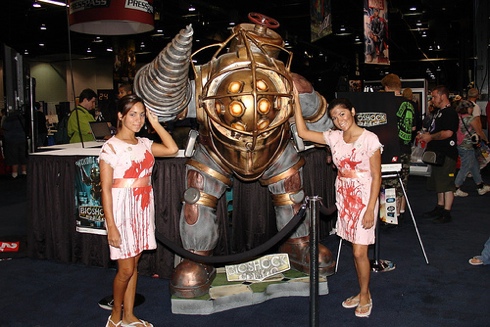The most recent episode of Rebel FM had a very interesting discussion about mature content in video games. With the recent revelation that GTA: IV The Lost and Damned features a few racy seconds of male junk on your television screen, the crew attempted to shed some light on the subject of maturity in all of its forms. It's a good listen and I'd recommend anyone interested in the current trajectory of the industry to give it a listen. This spawned a conversation that tried to establish what should be considered "mature" content and the differences between material in a game being "mature" in the violence tolerance and sexual definition of the word or "mature" in the sense of being a concept or theme that may be inappropriate, disturbing or present subject that intellectually goes over the head of younger gamers. This discussion ignited my passions, forcing me try to deeply consider maturity in the latter sense. The Rebel FM podcast quickly turned toward the discussion of maturity in various FPS and Gears of War style games, which inspired me to conceptually think about how these type of games have matured and whether the more cerebral effects that a game has on a player reached the same level as with the ability to project realistic battle situations and graphic fidelity.
My hypothesis for this piece is that the FPS genre, with a few shining exceptions, is still stymied in a state pre-pubescence conceptually and theme wise. I think though that its is only fair that I reveal my own biases. I strongly believe that placing a player in a first person perspective in innately the most visceral and effective method for a game to put the player into the shoes of their avatar, the type of game that best translates the will of player onto the game world through a avatar.

CoD: 4 is a title that does a great job of placing you into realistic adrenaline pumping situations that are relatively akin to being in a battle that takes place in a relevant and culturally important local. A lot of FPS titles are able to pull this off, I think that we have reached a point in the Genre where most games can produce graphics and moments in battles that are a mature and realistic facsimile of what occurs on a battle field. The sound, the weapons, the blood, the guts, the machines of war and societal strife. Games like the CoD series for real world scenarios and Halo for Science-Fiction style shooters have set bars of quality that most games are able to attain, the actual gun play and mechanics of these games are fun, utilitarian and show a high level of maturity for the genre in the areas of level design structure. These evolutionary process has resulted I think in the FPS genre, especially in the case of console shooters, being in the grand scheme establishing a highly playable and engrossing paradigm. These successes are mitigated by the lack of "impact" that many of these games have and by the lack of ingenuity in the genre when it come to exploring new themes.


Where the game fell short for me as far as maturity for the genre was that constant pushing, even though the themes that were touched were very thought provoking and mature intellectually, the gameplay and pacing rarely reflected that bleakness. The game doesn't explore the concepts of an army being forced to retreat, an army slogging through the same territory again to conquer a hill or city they had won and then lost again in a week, the dialog is very macho and mature in the expletive sense, but does not explore the impending bleakness of the war that is depicted while your playing. Kill Zone 2 may be a better, more playable game exploring the major mature themes of the game visually, rather than with gameplay or pacing. I do not fault them for making the choice as the things I wanted from the game could have been disastrous if poorly implemented, but it made me feel like Kill Zone 2 didn't really exceed other games from the genre in exploring mature content and themes.

CoD: 4 should also be applauded for how its methodology in creating a mature and impacting experience. It produced moments that went beyond just the battlefield, it made you question what it means to die in a game and that wars and battles don't just proceed forward in a very determinable way. The game is very "pushy" in its pace but does a nice job of exploring these other aspects of modern warfare that illustrate what it really means to be a soldier or civilian in a war zone.
Though I have a very dour and pessimistic view of the genre at this time, I still do enjoy the gameplay advances that I have seen and just hope that in the future it is possible to integrate more mature themes such as the horrors of nuclear war, guerrilla warfare, trench warfare, unending wars, colonization and other very important, very relevant themes that exist in our world. I really hope that devlopers can expand from their focus on recreating WWII, modern war and sci-fi settings in favor of different conflicts that had their own particularities. I am still waiting for a game that really explores the bleakness and the dread of World War I in an entertaining fashion. Kill Zone 2 is an interesting near-future setting allegory on World War II but the themes and purposes of that war have been beaten to death.
Well, this was a long and rambling rant. I guess it now comes to the question that I'm putting to the community. Are my opinions valid? Should maturity in the genre be defined in this way and head in that direction? What type of themes, setting and conceptions would you like FPS games to explore?
Note: This blog is so freakin long that its going to be only partially edited for a bit, I'll get back to gussying it up and making it intelligible after I take a break
Log in to comment